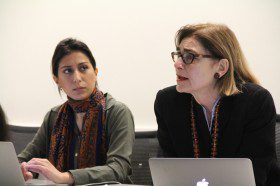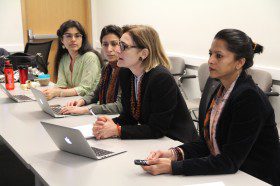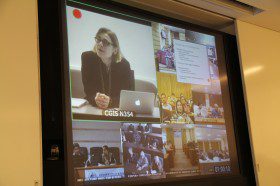 On November 25, 2013, SAI hosted a webinar titled “Tackling Gender Based Violence in South Asia – What Options Do We Have?” as part of SAI’s ongoing webinar series. The interactive discussion featured sites across Pakistan, India, and Bangladesh. To make the webinar interactive across the globe, SAI utilized social media to take questions and monitor the discussion online.
On November 25, 2013, SAI hosted a webinar titled “Tackling Gender Based Violence in South Asia – What Options Do We Have?” as part of SAI’s ongoing webinar series. The interactive discussion featured sites across Pakistan, India, and Bangladesh. To make the webinar interactive across the globe, SAI utilized social media to take questions and monitor the discussion online.
The event was made possible using live conference technology with the Higher Education Commission in Pakistan, which allowed the various sites to participate in the discussion live and ask questions during the event. The participating sites included universities in Pakistan, including in Lahore, Rawalpindi, Islamabad, Karachi, Multan, as well as centers in Pune, India and Dhaka, Bangladesh. Each site had around 20 students watching live and asking questions. The event was also streamed live on SAI’s website.
The faculty speaker was Professor Jacqueline Bhabha, FXB Director of Research, Professor of the Practice of Health and Human Rights at the Harvard School of Public Health, the Jeremiah Smith Jr. Lecturer in Law at Harvard Law School and Adjunct Lecturer in Public Policy at the Harvard Kennedy School. After an introduction by Meena Hewett, Executive Director of SAI, Professor Bhabha gave a presentation about the issue of gender violence, and possible paths to prevention.

Professor Bhabha touched on several methods of prevention, including better police training, which also means an increase in accountability of elected officials. “For many women, this is a form of domestic terrorism,” Professor Bhabha said. There needs to be a shift in attitude about how sexual violence perpetrators are viewed, including increased impunity for offenders. She also advocated for increased protection for survivors, including support, rehabilitation, and a recognition of the effect on mental health. Medical workers must be better trained to recognize signs of domestic violence.
Professor Bhabha gave the example of an Indian journalist at Tehelka, who was recently accused of sexual harassment but claims to have done nothing wrong. This is an example of the social norms that govern societies in South Asia. As a political society, Professor Bhabha said it is also on the responsibility of everyone to try to change these norms.
In order to prevent gender-based violence, social norms must change. Professor Bhabha explained that gender norms have become skewed over the century. For example, many boys in South Asia grow up with a sense of entitlement that is learned from school, movies and on the street. The burden does not fall on one particular group or sector; rather society as a whole is to blame. Professor Bhabha also addressed the education system, which is not truly coeducational. She said that from a young age, many girls live in discreet gender worlds, which makes it hard to become familiar with normal social exchanges. It is vital that both girls and boys form normal friendships at a young age with the opposite gender and develop a sense of normalcy.
Professor Bhaba also discussed another troubling norm in South Asia: the apprehension to talk about sexual and reproduction issues, even among close family members. Discussing sexual health is seen as illicit. Sexual violence should not be seen as “a private shame, a guilty secret for the woman.” Access to contraception was also discussed, which Professor Bhaba described as an important right for a woman to be able to control her own fertility.

The gender hierarchy also plays a factor in social norms around gender violence. From a young age in the home, boys are encouraged to play and do homework, while girls spend their time working in the home. This is especially true in rural communities. Many boys are also influenced by peer-group pressure, which can result in boys becoming violent who would have not have otherwise participated. To combat this norm, Professor Bhaba explained that it is important to “make it cool to be kind, not to be aggressive,” and incentivize good behavior by making it the cool thing to do.
Going forward, Professor Bhaba shared several other strategies. She explained that the media can be an important ally when used correctly. For example, changing the dynamics of popular soap operas, telenovelas, in Latin America was seen as an effective way to reduce violence against women in that society. The development of new adolescent curriculum is vital, which is already underway in some areas. Professor Bhaba explained that groups of women organizing through activism can be very powerful.
Overall, Professor Bhaba explained that change must come from within communities, not from top-down. This is why many of the policies related to gender violence has failed to change the situation. Women, as well as men in communities, must work to change these social norms. Social and economic conditions that contribute to poverty must also be addressed in order to truly combat gender violence.
This issue, which has been making headlines around the world recently, is an important one for South Asia. This webinar helped to promote further discussion about prevention methods and showed that there are many people across South Asia who want to tackle this issue and promote change.
Mariam Chughtai, doctoral candidate at the Harvard Graduate School of Education and SAI intern, moderated the discussion. Erum Sattar, SJD Candidate, Harvard Law School and SAI intern tracked the discussion on social media.
Blakeman Allen, who is the director of Pakistani Educational Leadership Project at Plymouth State University in New Hampshire wrote to SAI, saying, “Thanks again to SAI for providing more opportunities that address changes in societal norms. With the project encompassing 238 alumni change agents, and focusing on grassroots mobilization through educational leadership – and with over 75% of the alumni female leaders – the webinar resonated. And the Pakistan real-time inclusion was wonderful, too.”
SAI will host more interactive webinars in the spring semester of 2014. Please check SAI’s website for future updates.
-Meghan Smith
